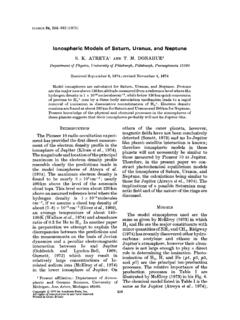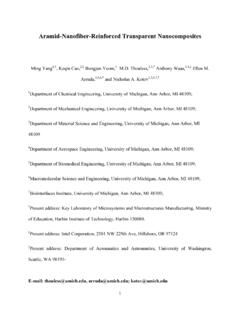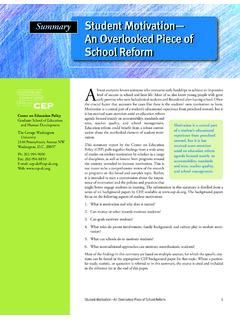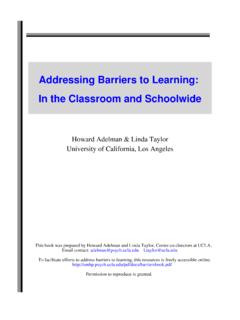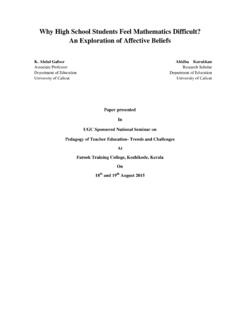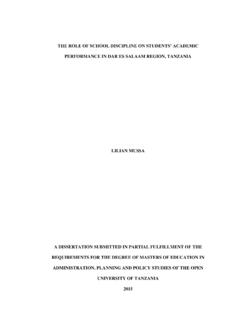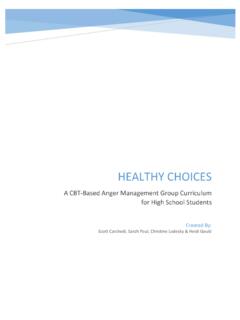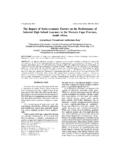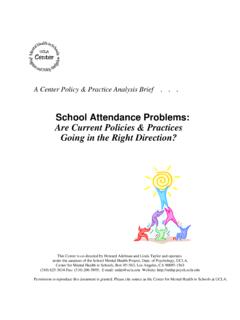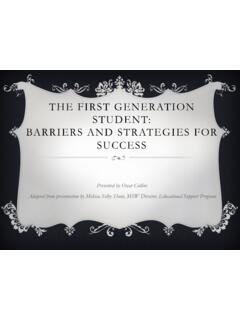Transcription of Mental Health and Academic Success in College
1 1. Mental Health and Academic Success in College (revised and resubmitted to the Journal of Economic Analysis & Policy). May 2009 (first version January 2009). Daniel Eisenberg (University of Michigan, Ezra Golberstein (Harvard Medical School, Justin Hunt (University of Michigan, Abstract Mental Health problems represent a potentially important but relatively unexplored factor in explaining human capital accumulation during College . We conduct the first study, to our knowledge, of how Mental Health predicts Academic Success during College in a random longitudinal sample of students. We find that depression is a significant predictor of lower GPA and higher probability of dropping out, controlling for prior Academic performance and other variables. The association between depression and Academic outcomes is strongest among students with a positive anxiety disorder screen.)))
2 In within-person estimates using our longitudinal sample, we find again that co-occurring depression and anxiety are associated with lower GPA, and we find that symptoms of eating disorders are also associated with lower GPA. This descriptive study highlights the policy relevance of generating more definitive causal estimates of the effect of Mental Health on College Success , which will likely require a randomized trial. 2. Acknowledgments This study was funded by the Blue Cross Blue Shield Foundation of Michigan and the following units at the University of Michigan: the Comprehensive Depression Center (Innovation Fund), the School of Public Health , the Department of Health Management and Policy (McNerney Award), the Rackham Graduate School, and the Office for the Vice President of Research. During the writing of this paper Ezra Golberstein was funded by NIMH (T32 postdoctoral traineeship) and Justin Hunt was funded by the Robert Wood Johnson Foundation Clinical Scholars Program.
3 We are grateful for helpful comments from Martha Bailey, Jason Fletcher, Richard Frank, Tom McGuire, Ellen Meara, Kevin Stange, Jacob Vigdor, two anonymous reviewers and participants in the University of Michigan informal labor economics seminar. We are also grateful to Scott Crawford and the Survey Sciences Group for implementing the web surveys, to Sarah Gollust and Jennifer Hefner for assistance developing the Healthy Minds Study, and to Andy Cameron for assistance acquiring the administrative data. 3. Americans are inundated with messages about Success in school, in a profession, in parenting, in relationships without appreciating that successful performance rests on a foundation of Mental Health . United States Surgeon General's Report on Mental Health , 1999. 1. INTRODUCTION. Among children and adolescents in the United States, Mental disorders are estimated to account for a larger burden of disease, as measured in disability- adjusted life years (DALYs), than any other class of Health conditions (Michaud et al.)
4 , 2006). One of the primary concerns in younger populations is that Mental Health problems may affect human capital accumulation in particular, the amount and productivity of schooling which may in turn have lifelong consequences for employment, income, and other outcomes. Understanding the link between Mental Health and Academic Success is therefore a crucial step towards assessing the returns to preventing, detecting, and treating Mental Health issues among young people. In this paper we analyze the connection between Mental Health and detailed measures of Academic Success during College . In the modern economy, College education has become an increasingly important component of human capital, and is associated with substantially higher earnings (Jaeger & Page, 1996;. Kane & Rouse, 1995) and better Health outcomes (Cutler & Lleras-Muney, 2006;. Ross & Mirowsky, 1999).
5 Approximately two thirds of high school graduates attend College ( Department of Education, 2006), but fewer than 50 percent of College enrollees graduate (Knapp, 2007), and this proportion is 12-18 percent lower among students who are black, Hispanic, American-Indian, or lower socioeconomic status (Horn & Berger, 2004). Previous studies have considered a range of factors such as financial aid (Dynarski, 1999) and Academic and social involvement (Tinto, 1998) that affect remaining in and completing College . Another important factor may be Mental Health . Mental disorders frequently have first onset shortly before or during the typical College age range (18-24) (Kessler et al., 2005), yet relatively little is known about the link between Mental Health and Academic Success in College . Understanding this connection could be valuable due to the many ways in which College settings can reach young people; College represents the only time in many people's lives when a single setting encompasses their main activities, social networks, and a range of supportive services and organizations.
6 We examine how symptoms of Mental disorders predict Academic outcomes during College using unique data collected at a large, academically 4. competitive, public university. We surveyed a random sample of approximately 2,800 undergraduate and graduate students about a range of Mental Health issues in fall 2005, and we conducted a follow-up survey with a subset of the sample in fall 2007. In this paper we focus on three of the most common types of Mental disorders among adolescents and young adults: depression, anxiety disorders, and eating disorders. We link the survey data on Mental Health to Academic measures collected from the university's administrative records. This is the first study, to our knowledge, that examines how Mental Health predicts GPA and dropping out in a random sample of College students. We find that depression is a significant predictor of lower GPA and higher probability of dropping out, even after controlling for symptoms of anxiety and eating disorders, prior Academic performance, and other covariates.
7 Depression also appears to interact with anxiety; the association between depression and Academic outcomes is particularly strong among students who also have a positive screen for an anxiety disorder. Among the symptoms of depression, the strongest negative predictor of Academic performance is anhedonia (lack of pleasure and interest in usual activities). By contrast, negative affect per se (feeling depressed or hopeless) is not independently associated with a lower GPA. Finally, in fixed effects (within-person) regressions of GPA on Mental Health variables using the longitudinal sample, we find again that co-occurring depression and anxiety are associated with lower GPA, and we also find that symptoms of eating disorders are associated with lower GPA. This study is best characterized as a detailed descriptive analysis of the association between Mental Health and Academic outcomes in College , rather than a causal analysis.
8 In the final section of the paper we illustrate that, if the estimates were assumed to be reasonable approximations of causal relationships, then they would imply sizeable economic returns, relative to the likely costs, from programs to increase the detection and treatment of depression among College students. This exercise underscores the policy relevance of acquiring more definitive knowledge about the causal effect of Mental Health on College Success , which will likely require a randomized trial of Mental Health treatment that collects detailed Academic outcomes. 2. CONCEPTUAL FRAMEWORK AND RELATED LITERATURE. CONCEPTUAL FRAMEWORK. Mental Health may affect College students' Academic outcomes along two margins: 1) the decision to remain in school; 2) productivity, or performance, 5. given that one is in Regarding the first margin, in a simple economic model of schooling attainment the individual chooses the amount of schooling, s, to maximize the present discounted value of future income, V(s), where y denotes earnings, r denotes the discount rate, A denotes abilities, and R denotes the time of retirement or death (Becker, 1993).
9 R. V ( s ) = y ( s; A)e rt dt s Poor Mental Health could reduce the marginal return to continuing schooling ( V / s ) for any of the following reasons: a) decreasing one's performance while in school, which may reduce the accrual of both real skills and outward signals ( , graduating with a high GPA) that increase expected job opportunities and productivity; b) decreasing one's expected future Mental Health , which in turns decreases one's expected productivity in future employment ( , by decreasing one's expected reliability); and, c) shortening the time horizon over which one expects to be in the labor force (reducing R). Although in theory these factors could imply that poor Mental Health causes an increase in schooling (due to the income effect the higher marginal value of income at lower levels, in this case), we hypothesize that these factors on balance would cause a decrease in schooling (due to the predominance of the substitution effect the lower marginal return to schooling) and therefore an increase in the likelihood of dropping out.
10 This hypothesis is also based on the additional possibility that poor Mental Health may decrease one's interest in the future (one's discount rate), which would reduce one's willingness to make long-term investments like schooling. As a simplified model of the second margin of interest Academic performance while in school Todd and Wolpin (2003) propose that achievement T ( , test scores or grades) at age a is a function of family inputs, Fi (a) , and schooling inputs up until age a, S i (a ) , and a fixed natural ability, Ai 0 : Tia = Ta [ Fi (a ), S i (a ), Ai 0 ]. Cunha and Heckman (2006) supplement this type of model by emphasizing that ability consists of cognitive and noncognitive skills that evolve over time. They mention several examples of noncognitive skills that may affect the acquisition of cognitive skills: persistence, motivation, consistency, patience, self-control, self- discipline, self-esteem, and interpersonal behavior.






